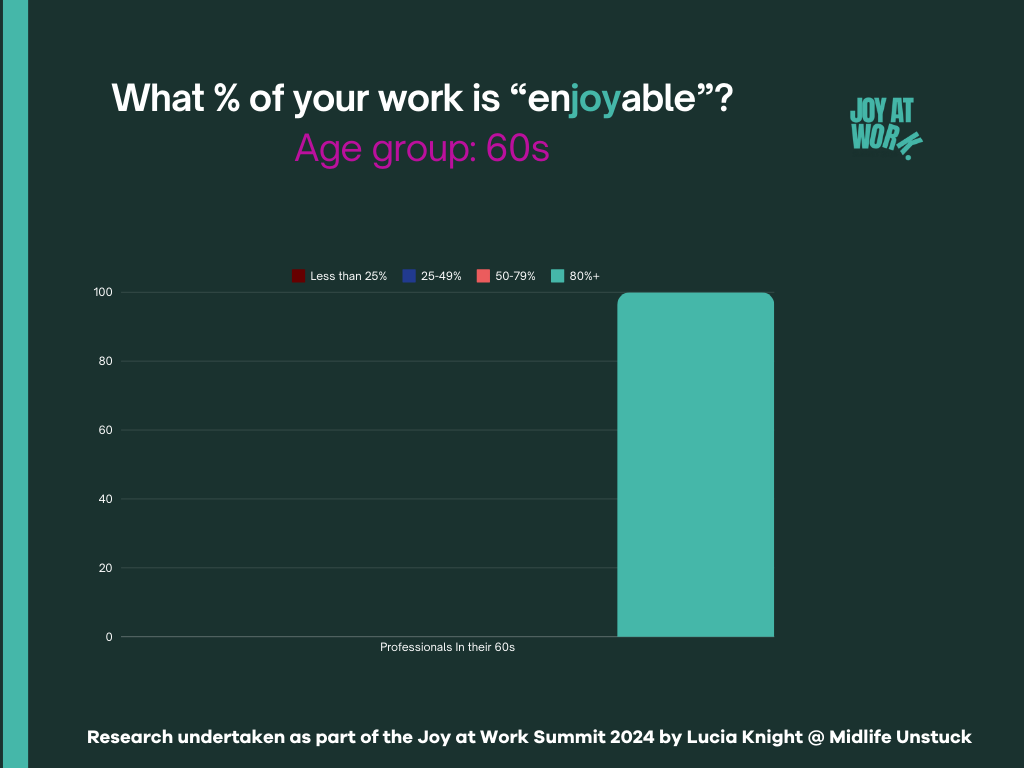You’re not alone…what stops others from experiencing Joy at Work?
The Joy at Work Summit 2024 was the first of its kind.
What was it?
An online event, designed for time-poor mid-career professionals who want more joy at work - no matter whether they’re experiencing 10% or 90% joy at work currently.
It happened in July 2024.
It was delivered by private podcast.
It included 25 x ten-minute interviews with speakers with specific expertise that positively influences Joy at Work.
And you can still access it by subscribing here…or clicking the button below.
So Lucia, you don’t know everything about joy at work, hey?
I don’t know any other career consultants in the world who are qualified psychologists, have nearly 20 years head-hunting experience and who invest at least half a day a week researching new life-satisfaction research and integrating the best ideas from clinical advancements into career happiness design programmes. Maybe you do?
But I can’t short-cut the decades of learning that my specialist guests on the Joy at Work Summit have invested in.
They’ve spent large swathes of their lives learning about:
wealth managment, psychotherapy, 4 day working weeks, staff engagement, productivity transformation, less-than-full time work design, LinkedIn, dressing for confidence, public speaking, executive search relationships, personality profiling, becoming more visible, earning highly, first-time entrepreneurship in midlife, weird work, playing for success, midlife job-hunting, burnout, writing your first book, creating your first podcast and lots more.
I brought together 25 specialists, whose books I’ve read, whose programmes I’ve invested in and whose work has influenced my work.
I asked them three or four questions, in less than ten minutes, so that you get to benefit from their knowledge, as quickly as possible.
You are not alone…
I thought you might be interested in learning more about those who attended the summit to understand if their Joy at Work problems might be similar or different to your Joy at Work problems.
Because when I was feeling stuck in my career, I felt alone for years. (Here’s my story in a Tedx)
And I don’t want that for you.
Insights from attendees of the Joy at Work Summit 2024
After registering, all attendees were asked to complete a personal Joy at Work questionnaire.
97% of attendees answered all the questions. Here’s what they said about their own joy at work situations.
It’s worth noting: the over-60s professionals who joined in the summit were the smallest age-group of attendees. Professionals in their 30s were the second smallest attendee grouping.
Thoughts and questions
Why did the over-60s professionals who joined the summit rate their enjoyment of work so highly? Perhaps what we focus on becomes our focus? If we don’t focus on our own joy at work journey…who will?
Professionals in their 30s aren’t experiencing extremes. Zero participants experienced less than 25% or more than 80% joy at work.
The 40s and 50s group experienced a similar distribution of work enjoyment across both age-groupings. So we need to dive into the detail to understand if their joy at work experiences are similar.
Thoughts
The over-60s were the only group of professionals who listed only two major obstacles to enjoyment at work.
As with all age groups time pressures remained a dominant challenge.
This group experienced a surprising challenge that can accompany meaningful work - the difficulty in disconnecting from work that matters to them. Perhaps this is a nice problem to have - but nonetheless a barrier to work-life enjoyment.
Thoughts
Challenges are more diverse for professionals in their 50s, although time pressures dominate, as with all age-groups.
The over-50s were the only group who listed what we call “corporate nonsense” as a major obstacle. This included toxicity, cultural mismatches, disconnected leadership and office politics.
Boredom is a recurring pattern for professionals in their 40s and 50s. Confidence, questioning of future direction and ability to market themselves appear.
Thoughts
For the over 40s, finances is listed in their top 3 obstacles to experiencing more joy at work. This is the group most likely to have young dependents.
And we see in almost every age-group (apart from the 60s+) boredom and time pressure concerns continue to hinder joy at work.
Personal concerns about future direction, confidence and marketing of self appear - in similar proportions to the over 50 group.
Thoughts
The over-30s age group appear to be experiencing the most company dynamism in their careers - two of their major obstacles to joy at work are company instability and having already experienced redundancy. This was somewhat surprising as media coverage would suggest that these impact the over 50s age-group most intensely.
Graphic illustrations from each talk from the wonderful Caroline Chapple
I had been following Caroline’s work for years when I invited her to join the Joy at Work Summit team.
She said “yes” and her work is so magnificent that I wanted you to have access to it so you can pour over her key takeaways from the comfort of your sofa.
I’m a #superfan of her work and have suggested we create a book together, design wallpaper together or that she just let me watch her work. She hasn’t said “yes” to any of those…yet.
Speaker focus: Different modes of working and finding the right roles.
Speaker focus: Health at work and wider influences on joy at work.
Would you like to design more joy at work? Here’s how…
Joy at work is a possibility for all professionals but it doesn’t often happen by chance.
And it’s not something we were ever taught how to create.
But it’s something you can learn how to do - so that you can enjoy the benefits for the rest of your career.
I train professionals to become their own personal Joy at work designers in two different ways. Click the buttons below to dive into what’s included in each.





































